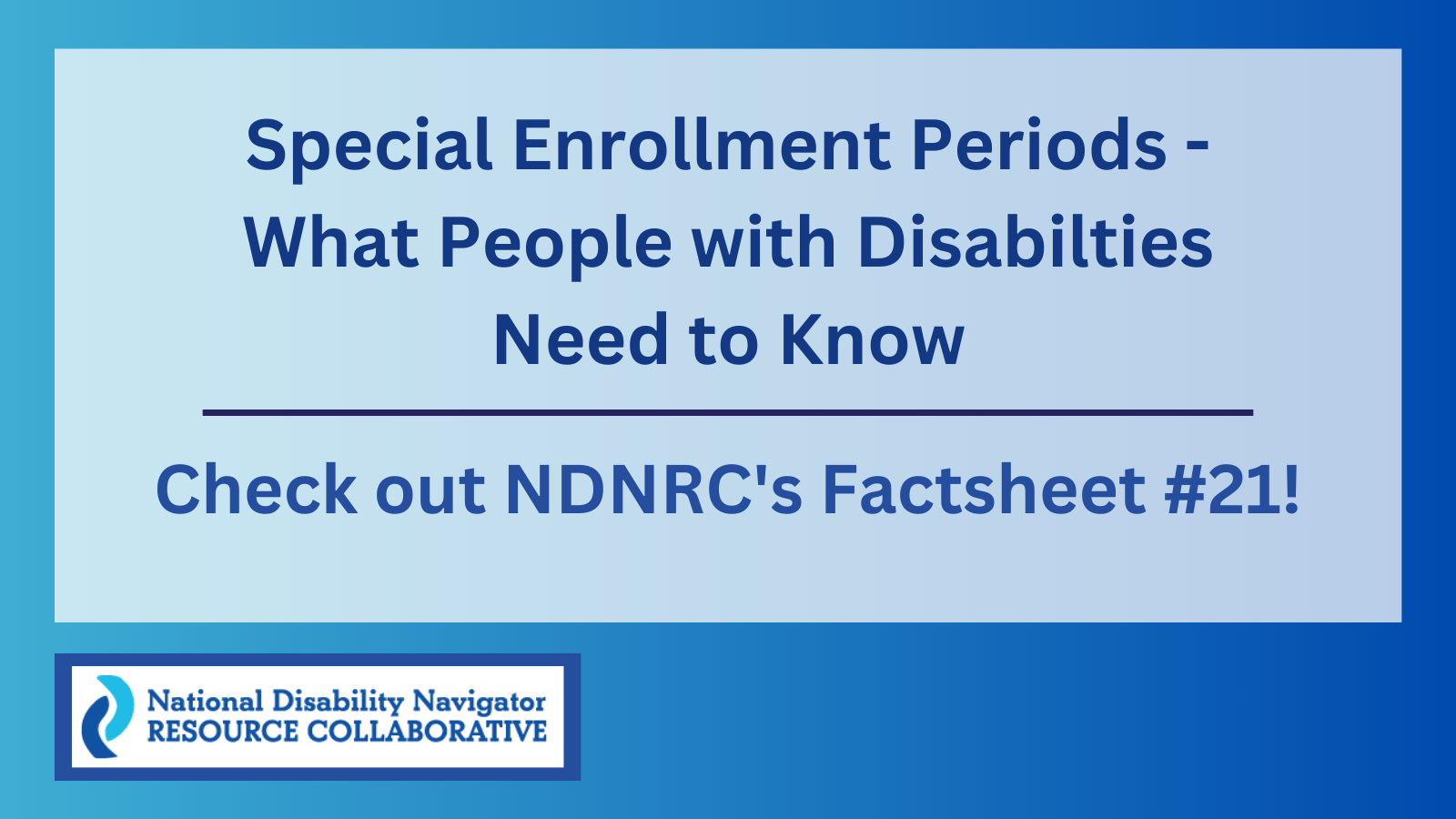NEW FACTSHEET ON SPECIAL ENROLLMENT PERIODS!
The NDNRC has just released its latest factsheet on specific information on the availability of special enrollment periods, which are qualifying events that allow individuals to enroll in Affordable Care Act (ACA) Marketplace coverage outside of the open enrollment period, for people with disabilities and unique circumstances that they may face.
This factsheet is especially important, as the Centers for Medicare and Medicaid Services (CMS) has released new provisions due to the unwinding of Medicaid. See if you qualify for an ACA Marketplace plan at HealthCare.Gov and get covered today!
As of April 11, states have reported renewal outcomes for more than half of those enrolled in Medicaid/CHIP, according to data from the Kaiser Family Foundation (KFF) with 30.4 million renewals still remaining. 21% of those who completed the renewal process were disenrolled and 43.6 million enrollees were able to qualify for renewed coverage. The large range of disenrollment rates in each state varies, with the highest of 57% being in Utah and the lowest of 12% in Maine. Out of all states with available data, 69% of all those disenrolled were due to procedural reasons.
The Center on Budget and Policy Priorities (CBPP) posted a concise report on building the ACA and strategies on how to address the cost challenges that ACA Marketplace enrollees face. The breakdown of this reading are affordability pain points and potential policy solutions.
CBPP also analyzed the importance of focusing on ACA Marketplace cost sharing in the next round of ACA Marketplace changes. The previous report from CBPP’s Marketplace Affordability Project (MAP) highlights the issues and what specific policies to decrease or remove entirely to ensure affordability in plans.
Georgetown University’s Center for Children and Families (CCF) covered CMS’ second part of the two-part final rule that helps increase eligibility and simplifies the enrollment process for Medicaid, the Children’s Health Insurance Program (CHIP), and the Basic Health Program. This will help keep continuous coverage for children with disabilities and will go into effect on June 3, 2024!
CMS has addressed the on-going reports of consumers using the HealthCare.Gov portal who had their coverage changed unknowingly and illegally by agents and brokers. CMS is taking serious and immediate actions in protecting consumers. If you or someone you know sees unauthorized activity on HealthCare.Gov profiles, contact the Marketplace Call Center at 1-800-318-2596 (TTY: 1-855-889-4325). A news post from KFF Health News covers this topic.
The Commonwealth Fund discussed lessons learned from the current Medicaid unwinding. “Over three years, enrollment surged by more than 20 million people; by the start of unwinding, total enrollment was 94 million. States have completed about two-thirds of all scheduled renewals, but months of work remain.” This article also stated that more than 30% of those in the renewal process have lost coverage, emphasizing the cracks in our healthcare insurance systems.
KFF completed a survey on the Medicaid unwinding. Key takeaways include 1 in 5 enrollees stating that they were disenrolled from Medicaid coverage at some point, uninsured adults note cost changes/lack of affordability in not getting new health coverage, and negative experiences in obtaining new healthcare coverage.
KFF also compared how states have been using Medicaid waivers to help incarcerated individuals in obtaining care and transition back into community living. Key takeaways include that this population faces higher rates of chronic disease, substance use disorders, and increased behavioral health needs.
The National Academy for State Health Policy reported on maternal health outcome disparities for Black women. Key takeaways from this report include that black women are three times more likely to die from pregnancy-related causes than white women and 30% reported that they experienced mistreatment during maternity care. This becomes further impounded with intersectional identities, such as black women who have disabilities.
The CHIRblog covered the benefits of health savings accounts, which attribute to a reduction in taxable income through payment for medical costs, and how expanding them could make current tax breaks worse without improving access to coverage or care. They also released a March “What We’re Reading” resource roundup!
The Department of Health and Human Services (HHS) celebrates the one-year anniversary of an Executive Order that helped increase access to high-quality care and support for caregivers.
Archives of our weekly updates are available on the NDNRC website. Follow us on Twitter/X at @NDNRC!

